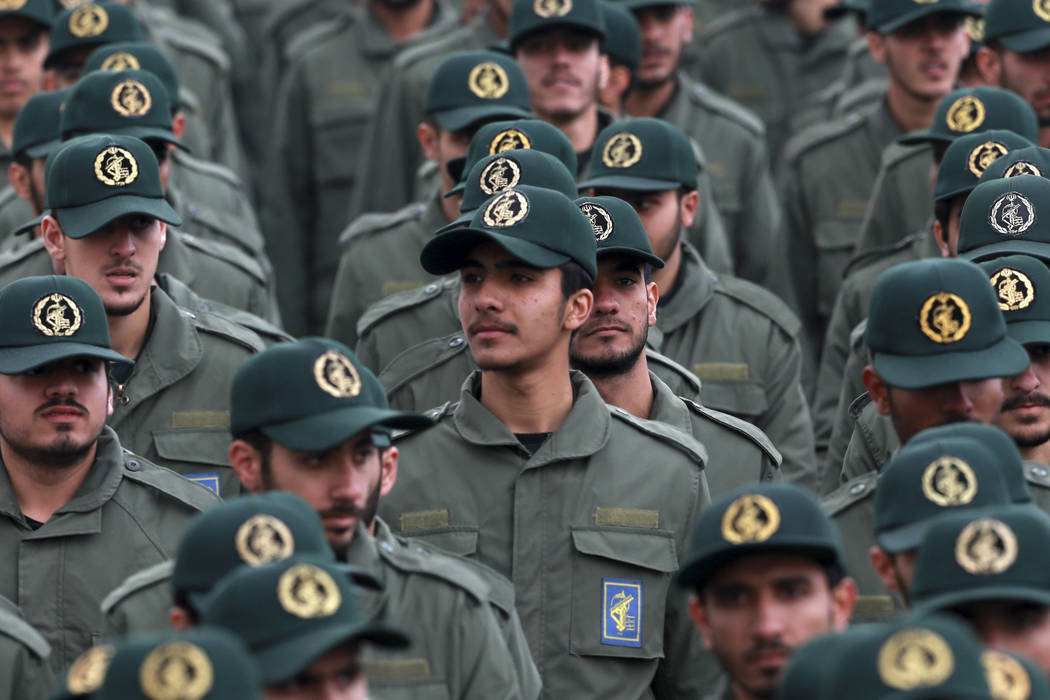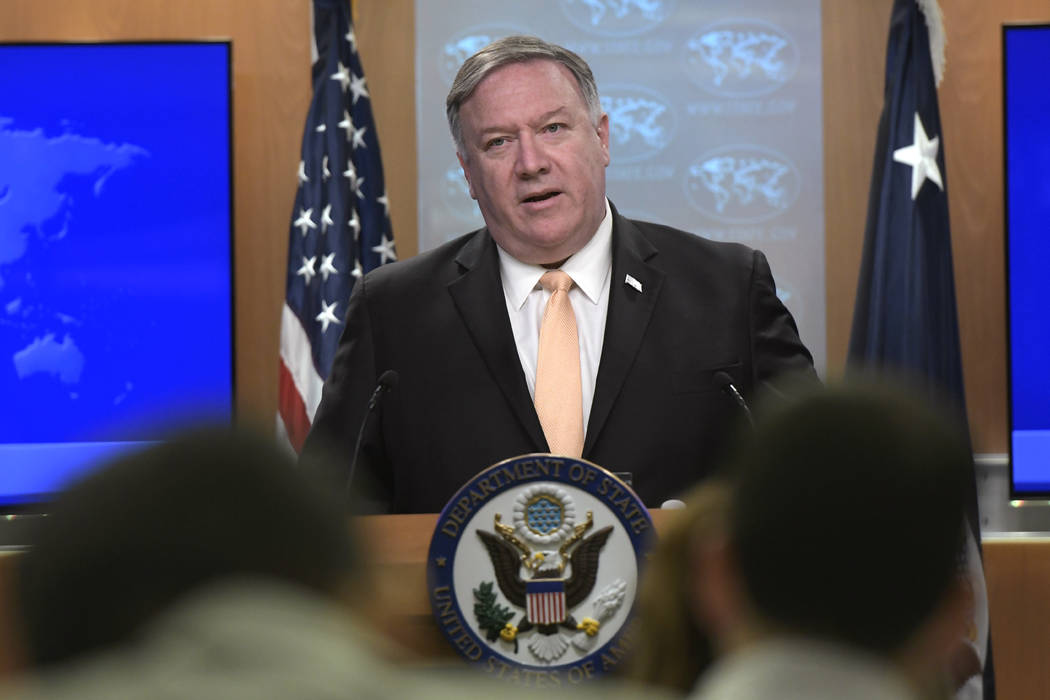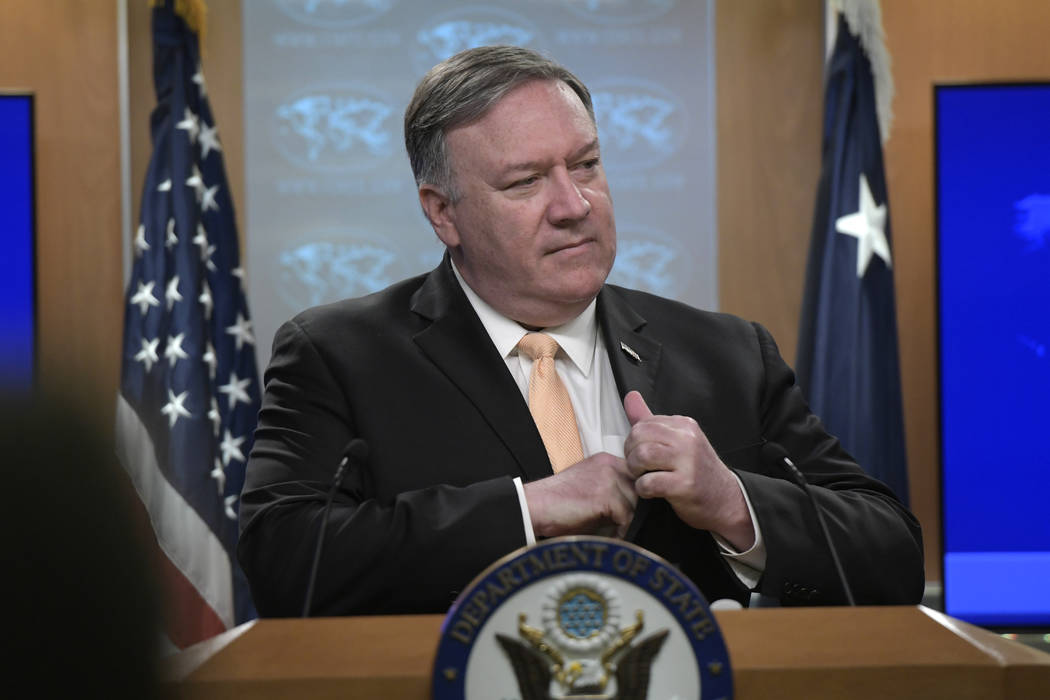US eases effects of sanctions on Iran’s elite guard force
WASHINGTON — The Trump administration on Wednesday granted important exemptions to new sanctions on Iran’s Revolutionary Guard, watering down the effects of the measures while also eliminating an aspect that would have complicated U.S. foreign policy efforts.
Foreign governments and businesses that have dealings with the Revolutionary Guard and its affiliates will not be subject to a ban on U.S. travel under waivers outlined by Secretary of State Mike Pompeo in two notices published in the Federal Register.
That weakens the effect of the measures and will frustrate members of Congress backing tough measures against Iran who are already concerned that the Trump administration won’t fully enforce sanctions on Iranian oil. But it lifts the threat that those who work with the U.S. in Iraq and Lebanon, where the Guard’s subsidiaries are active, will face the full weight of American penalties.
The waivers leave intact sanctions that apply directly to Iran’s Revolutionary Guard and its proxies, the first agencies of a foreign government that have ever been designated a foreign terrorist organization by the United States. The designation, which took effect April 15 , is part of a broader administration effort to increase pressure on Tehran.
Iranian Foreign Minister Mohammad Javad Zarif, speaking Wednesday in New York, said the administration is creating dangerous conditions with its campaign against Tehran. “Iranians are allergic to pressure,” he said, adding that he believes the conflict can be resolved diplomatically.
Under U.S. immigration law, foreigners found to have provided designated foreign terrorist organizations with “material support” can be banned from the U.S.
When it was announced earlier this month, the designation raised fears that U.S. diplomats and troops might have to end contacts with officials in countries that have ties with Iran or elements of the Guard, a paramilitary organization formed in the wake of Iran’s 1979 Islamic Revolution to defend its clerically overseen government.
Lebanon, where Iran and the Guard are active in their support of the militant Hezbollah movement, and Iraq, where they back Shiite militias and have close ties to the government, are two such countries where the U.S. is heavily engaged on military and diplomatic fronts.
Pompeo said in the notices that he decided to waive the travel bans in U.S. foreign policy and national security interests.
In one notice, he said the sanctions “shall not apply to any ministry, department, agency, division, or other group or subgroup within any foreign government” unless that entity is covered by existing U.S. sanctions.
In the second notice, he said the sanctions won’t apply “to any business, organization, or group, whether public or private, solely based on its provision of material support to any foreign government sub-entity that has been designated as a foreign terrorist organization.”
“At first glance, it looks like a wise carve-out,” said Daniel Fried, a former sanctions coordinator for the State Department who is now with The Atlantic Council. “One of the rules of sanctions is that you need to account for unintended consequences and have wide licensing and waiver authority. Otherwise, if there are unintended consequences you find yourself unable to act.”
The notices were published two days after the administration announced that it would not renew sanctions waivers for countries that import Iranian oil. Those waivers, which primarily affect five countries — China and India, Japan, South Korea and Turkey — expire on May 2. The announcement sparked a spike in world oil prices due to global supply concerns.
In the days since, however, concerns have been raised by Iran hawks that the administration may not impose sanctions on countries continuing their imports.
Under one scenario being considered by the administration, the countries could be allowed to place and pay for future orders of Iranian oil before May 2, essentially front-loading continued imports, according to officials, congressional aides and outside advisers familiar with the matter who spoke on the condition of anonymity to discuss internal deliberations.
The administration could then grant waivers from sanctions to transport and refine the oil under a 2012 law.
The State Department declined to comment on the possibility that Iranian oil imports might continue without sanctions.
President Donald Trump has said the goal is to cut Iranian oil exports to zero to choke off the estimated $50 billion a year it provided before sanctions were reinstated in November following the U.S. withdrawal from the 2015 Iran nuclear deal.
But officials in charge of Iran policy have not ruled out the possibility of allowing some importers additional time to wind down those purchases, drawing criticism from supporters of a “maximum pressure” campaign aimed at Tehran, which the U.S. says destabilizes the Middle East by supporting militant activity around the region.
“I think maximum pressure should mean maximum pressure,” Sen. Ted Cruz, R-Texas, told Pompeo earlier this month at a Senate Foreign Relations Committee hearing during which he implored the administration to adopt the strictest possible interpretation of the sanctions.
Sen. Tom Cotton, R-Ark., concurred. “Going forward, the proper amount of oil exports from Iran is zero.”
Outside opponents of the 2015 Iran nuclear deal also say exports must be eliminated for the maximum pressure campaign to succeed.
“There is no maximum pressure campaign without eliminating all Iranian oil exports. That must be the immediate objective,” said Mark Dubowitz, the chief executive of the Foundation for Defense of Democracies, a critic of the deal.



















